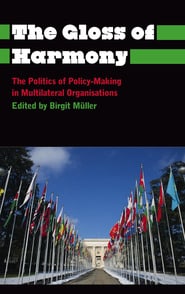Birgit Müller is a senior researcher at Centre National pour la Recherche Scientifique (CNRS). She is based in Laboratoire d’Anthropologie des Institutions and des Organisations Sociales (LAIOS) at Ecole des Hautes Etudes en Sciences Sociales (EHESS) in Paris. She is also the coordinator of the EASA network for the Anthropology of International Governance. Last July, during the annual meeting of the EASA in Tallinn, we discussed with her the possibilities of collaboration between Allegra and AIG. There are many exciting projects ahead of us, but for the moment, we would like to take the opportunity of this virtual meeting to introduce Birgit’s work as well as the history of the network.
Birgit Müller, you obtained a PhD from Cambridge University with a thesis in anthropology on alternative movements in West Germany. Can you tell us a bit more about this early research?
The choice in the beginning of the 1980’s of leaving African history behind and writing a PhD thesis on alternative movements in West Germany was linked to accounts I had to settle with Germany, my own society. While still in high-school the political climate in West Germany became more and more oppressive, stifled by the persecution of left-wing activists, teachers and civil servants accused of sympathy with left-wing terrorism. The emergence of the alternative movement was like a breeze of fresh air. Activists tired of authoritarian communist parties, ecologists and anarchists, the so-called spontis, came together to create all kinds of small initiatives, enterprises, housing communities that were radically anti-authoritarian, paid themselves the same salaries, refused to consider time at work differently than time off work and wanted to produce and promote useful objects. I set out to explore how these people were consciously involved in a social experiment in which they were at the same time the experimenters and the test subjects.
They experimented with different forms of working together, attempted to find forms of expressing antagonisms and divergent opinions without succumbing to insolvable conflicts. I showed the accomplishments and limits of such an approach of wanting to plant in the midst of capitalist society the seed for a new society.
Ultimately the alternative enterprises that I studied were unable to thrive while the economic system worked against them and most disappeared after the fall of the Berlin Wall when capitalism celebrated its victory over eastern European socialism. When I did my PhD this type of research in my own society was still considered exotic even at Cambridge.
Since your second monograph, Disenchantment with Market Economics: East Germans and Western Capitalism (Berghahn Books 2006), you redirected you research towards the anthropology of international organisations. What, in your view, is the added value of anthropology for the study of international governance?
International governance actually invaded my fieldwork when multinational corporations took ownership of former socialist enterprises that I was studying in Eastern Europe in the 1990s. Western managers went on a civilizing mission teaching the staff of former state-owned enterprises western management philosophy instead of socialist ideology. International governance was also present and decisive in the controversies around another form of appropriation: the emergence of intellectual property rights over living organisms, in particular seeds, which became one of my research focuses in the last ten years. As an anthropologist I wanted to see the people behind the international organisations, how do people in these organisations think, how do they take decisions, what is the social life of the documents they produce?
Understanding these big organisations as made by people with their contradictions, interests, strengths and weaknesses would also give tools for action to those who are affected by international governance, might provide strategic clues for how to influence the directions these constantly changing organisations take.
 You recently edited a collective volume entitled ‘The Gloss of Harmony’ with Pluto Press. The book focuses on the official objectives and unintended consequences of international governance. Why did you choose such an angle? What are the main ideas that come out of the book?
You recently edited a collective volume entitled ‘The Gloss of Harmony’ with Pluto Press. The book focuses on the official objectives and unintended consequences of international governance. Why did you choose such an angle? What are the main ideas that come out of the book?
In my research in the Food and Agriculture Organisation of the United Nations (FAO) and the Committee for World Food Security (CFS) I followed controversies about agricultural biotechnologies and land-grabbing. What impressed me was how these controversies that struck the heart of world food security and challenged enormous economic interests were rendered technical and harmonized by the mechanisms of governance that these organisations used. Intrigued by these findings and by the methodological challenges research in such large multi-facetted organisations poses I searched for other anthropologists working on international organisations that were encountering similar challenges. I brought them together in Paris in 2008 and 2010 to discuss methods and tease out the mechanisms of governance the international organisations that we were studying had in common. The book grew out of these exchanges.
The first mechanism we identified was the capacity of organisations of the UN system to render political conflicts technical, reducing them to technical issues of measures and numbers, of methods and ‘best practices’. We found what Tania Li phrased ‘ the discourse of good governance’ that focuses on the capacities of the poor rather than on the practices through which one social group impoverishes another. The second mechanism we found was the increasing tendency of international organisations to position themselves as ‘neutral or competent brokers’ between diverse interests, between donor and receiver countries rather than as the warrants of Human Rights on which the UN system is founded. Contestation was brought into the arena of UN-organizations not so much through its own democratic mechanisms but from the outside by a whole set of actors that gravitated towards the organisations and were drawn into its realm. How these non-State actors were educated, formatted and disciplined and became skilled at moving within these structures and across scales of governance was the third mechanism we identified.
 You are a specialist of GMOs issues. What are the main international institutions in charge of developing norms and regulations in the field of agriculture? Why do you think it is important for anthropologists to be involved in such organisations? What kind of knowledge can they bring to the debate?
You are a specialist of GMOs issues. What are the main international institutions in charge of developing norms and regulations in the field of agriculture? Why do you think it is important for anthropologists to be involved in such organisations? What kind of knowledge can they bring to the debate?
A whole bundle of international organisations deal with transgenic organisms in agriculture, with the health, sanitary and phyto-sanitary problems they pose, with the intellectual property rights that are attached to them. From the World Intellectual Property Organisation (WIPO), to the FAO, from the World Trade Organisation (WTO) to the World Health Organisation (WHO), all develop guidelines, administrate agreements on aspects of GMOs, but only a few have the possibility of actually constraining states to follow their rules. The most powerful one is obviously the WTO with its arbitration committee that can actually force states to accept its verdicts and apply penalties. The Human Rights based organisations of the UN system can only recommend and advise.
What one also has to look at are the international investor state arbitration committees housed by organisations like the International Centre for Settlement of Investment Disputes (ICSID), that is part of the World Bank Group and operates outside of national legislations. Bilateral Investment Treaties (BITS) and Comprehensive Economic and Trade Agreements have become a global economic fashion as the United States, Europe, Canada, India and China have signed a series of free trade agreements among themselves or with smaller trade partners.
Some of these agreements undermine the precautionary approach some states still uphold to restrict the introduction of GMOs into their agriculture and these arbitration committees operate under the radar of democratic policy making.
The problems such international governance poses for the regulation of GMOs but also for many other issues are thus enormous. Anthropologists can contribute to making them perceptible. I think the strong point of our discipline is that as anthropologists we never forget that international governance always affects concrete people in concrete places and situations. We should thus retranslate these extremely complex international regulations and agreements into their concrete impacts on people and the environment.
Our task should also be to penetrate as best we can these centres of power and unveil their formal and informal decision-making processes. This is of course all the more difficult when these organisations are powerful. Then they are also mostly opaque and closed to the public. We could become specialists for unveiling opacity, secrets, shady deals, for rattling at closed doors. Anthropology has a long tradition for doing that.
As a coordinator of the EASA Network on the anthropology of international governance, can you tell us a few words about the history of the network? Who were the founding members? When was it created?
The idea of creating a network of some sort emerged out of the Paris workshop of 2010. The people who took part in this meeting wanted to continue discussing without putting in place a heavy bureaucratic structure. To create an EASA network that was not restricted to European members seemed ideal for that, as it gave regularity to the network meetings at EASA conferences and EASA even provided seed money for meetings outside of that schedule.
 What is the main purpose of the network?
What is the main purpose of the network?
The main purpose of this network is to allow the increasingly numerous anthropologists who work on international governance to rapidly find partners with whom to exchange ideas, follow up cross-cutting issues that concern their particular field and find out what has been recently published about international governance.
What have been the main achievements of the Network since its creation? Are there any publications you would like to bring to the attention of our readers?
The main achievement probably is that we kept the issue of international governance going with workshops at the EASA and AAA conferences. The book from the Paris workshops came out. On a more practical level, we created individual web profiles for each member which present the issues members are interested in, list their publications and refer to readings they recommend. On the Network pages we also announce events and encourage members to announce new publications, articles or books with a short description. This possibility has not been used sufficiently by the members yet and could also be used by non-members as long as the publication deals with the anthropology of international governance. It is very simple and members just have to send their abstract of the article or book with or without a title picture of the book to me or/and to Eli Bugler at webweaver@easaonline.org
Which direction would you like the Network to take in the future? How do you think the Network could better contribute to the production of scholarship in our small sub discipline?
The network has two very strong points: one is the political relevance. One cannot think anymore about politics and policy-making without considering the international dimension. Political and economic anthropology has to embrace this dimension if it does not want to loose its link with reality. The second strong point of the network is methods. We try to think in common how we could study the international dimension of governance, with what methods. How can we succeed in making acting individuals and groups behind international governance visible?
A call for further discussions of methods was strong in the last network meeting in August in Tallinn. Members suggested to look at infrastructures of international governance: buildings, websites, meeting rooms. They were interested in the social life of documents and how to study it on paper, in meetings, on websites and relatedly how to become literate with the formal legal documents as an anthropologist. Another methodological question was how to study policy translation chains, processes by which policies are translated into real action on the ground. It was suggested to focus on global governance and self-governance through ethical regulations and global codes of conduct, to follow chains of decision-making and the methodological problems related to this. There was also a strong interest in following individuals in and out of international organisations.
Many of these issues are not limited to questions of international governance only and concern members of other networks, for example the EASA Network on the Anthropology of Law and Rights, the Network on Social Movements or the Network on the Anthropology of the Economy.
I would like to see a stronger cooperation between networks and I would like to see young anthropologists without an established position and older established ones to take initiative, dig into the resources we have laid out for them and organise meetings, special issues, workshops. I will be happy to support them as best I can.








